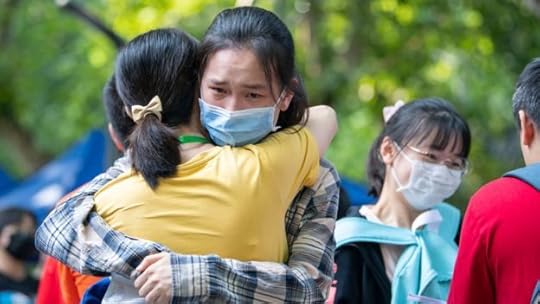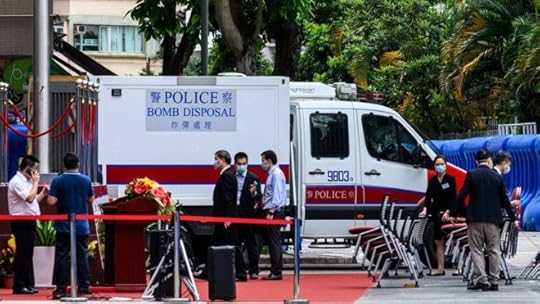Zhang Chiahou's Blog, page 10
July 11, 2020
Indian gangster accused of killing eight policemen shot dead
Forensic team work near a toppled vehicle which was carrying Vikas Dubey, accused of killing eight policemen, in Kanpur, Uttar Pradesh, India July 10, 2020, in this picture grab taken from a video. ANI/Reuters TV via REUTERS
LUCKNOW, India (Reuters) – Indian police shot dead on Friday a man who had been accused of ordering the killing of eight policemen when he tried to flee from officers who had taken him into custody after he surrendered, officials said.
Vikas Dubey, who was on the run for over a week after he allegedly ordered the eight policemen killed, was shot dead in northern state of Uttar Pradesh (UP) after an accident as he was being taken to detention.
“We were bringing Dubey to the prison when a car he was in overturned … we had to shoot him because he stole a policeman’s gun and tried to flee,” said a senior police official in the state capital of Lucknow.
Dubey had been accused in 60 criminal cases, of various offences including attempted murder, and talk of his links with police and politicians has been dominating headlines ever since the shootout last week in which the eight police were killed and seven wounded.
Two of Dubey’s aides were killed in last week’s violence and a police officer posted near Dubey’s village was arrested over allegations that he helped him flee.
With a population of more than 200 million, UP is India’s most populous state. It has long been plagued crime and corruption.
Source: Reuters
July 10, 2020
UK coronavirus live: quarantine rules end for some visitors; masks mandatory in Scottish shops
News updates: visitors from ‘safe’ countries to England, Wales and Northern Ireland exempt, though Scotland retains restrictions
UK opted out of EU vaccine scheme, sources sayScots to be able to meet indoors; Welsh pubs, cafes to open outdoorsTourists urged to avoid cruise shipsOutdoor entertainment to restart in England from 11 JulyGlobal coronavirus updates – live
LIVE Updated 2m ago
 Airport staff at the main terminal at Edinburgh airport: Scotland has not relaxed its quarantine rules. Photograph: Jeff J Mitchell/Getty Images
Airport staff at the main terminal at Edinburgh airport: Scotland has not relaxed its quarantine rules. Photograph: Jeff J Mitchell/Getty ImagesFri 10 Jul 2020 10.48 BSTFirst published on Fri 10 Jul 2020 07.43 BST
Shares13Comments2,468
38m agoDeaths of 16 homeless people with Covid-19 may be underestimate – ONS1h agoRelatives of dementia patients should be key workers, say charities3h agoBritish government follows Scotland on quarantine for travellers from Serbia
1 new update
Not a single person has been fined by police in England and Wales for breaching quarantine rules after arriving from abroad, according to new figures.
Just 10 tickets were handed out to passengers for not wearing face coverings on public transport, according to the data released by the National Police Chiefs’ Council on Friday.
The figures do not include fines given by Border Force, who have issued three penalties.
Two British nationals were fined at Coquelles, near Calais, in northern France, on June 28, while a European was issued a penalty in Hull the following day.FacebookTwitterAdvertisementhttps://tpc.googlesyndication.com/saf...
A trial is underway to use UV light to clean the handrails on escalators on London’s Tube network and is being assessed by Transport for London (TfL) with a view to rolling it out widely.
The device is connected to the escalator handrail and uses its motion to power a UV bulb that breaks down surface contamination to sanitise the handrail.
Andy Byford, London’s new Transport Commissioner, said: “A huge range of measures are in place across the transport network to ensure it is cleaner than ever, including the use of new hospital-grade substances, 1,000 hand sanitiser points, and a new trial of UV technology to sanitise hand rails.”FacebookTwitter
Today is the last day to register for free meals during the summer break and access the Covid-19 Summer Food Fund, which will allow schools to order free school meals vouchers for eligible children to cover the summer holidays.
Details for registration are here.
Boris Johnson was forced last month into a humbling U-turn over providing the food vouchers for some of England’s poorest families after a campaign launched by footballer Marcus Rashford threatened to engulf his government in another crisis.
Marcus Rashford(@MarcusRashford)
Guidance for how to apply for the COVID Summer Food Programme
Armed police officers and soldiers in Jiangxi fight against flood

Armed policemen load sand into bags for dyke reinforcement in Poyang County, east China’s Jiangxi Province, July 9, 2020.
Armed police officers and soldiers in Jiangxi have been fighting against the flood overnight, as heavy rainfalls swelled rivers and lakes and are forecast to continue.
Source: Xinhua
July 9, 2020
National college entrance exam ends in some parts of China
 Image caption Millions have now sat for the most important exam of their lives
Image caption Millions have now sat for the most important exam of their livesThis week around 10 million students across China have sat the Gaokao – a college entrance exam which determines their entire future.
Hanging over their heads, though, is the recent revelation that hundreds of other students before them were victim to an identity theft scandal which saw them robbed of their results.

For Chen Chunxiu, it was an exam that could change everything. Doing well in the Gaokao meant the farmer’s daughter had a shot of getting into her dream university. Failing meant it would remain just that – a dream.
She failed.
Denied admission to college, she took up various jobs – a factory worker, a waitress – before eventually becoming a kindergarten teacher.
But 16 years later, she found to her shock that she had, in fact, earned a place at the Shandong University of Technology – and enrolled there.
But it hadn’t been her. Her score – and in fact, her entire identity – was stolen by a girl whose relatives had pulled strings to make this happen.
Her case is just one of 242 student identity thefts that took place in Shandong province between 2002 and 2009, according to recent media reports.
A shocking tale of systemic cheating
The notoriously hard Gaokao – or “high school exam” – tests school leavers on their Chinese, maths, English and another subject of their choice.
It has been the focal point of the education system since the 1950s, with a break during the Cultural Revolution.
But it’s not just an exam. For millions – especially those in less privileged positions – it’s the ticket to success and upward mobility.
 Image caption Failing the Gaokao is seen as bringing shame upon the family
Image caption Failing the Gaokao is seen as bringing shame upon the familyThe family of Ms Chen, whose story has been widely covered in China in recent weeks, had high hopes.
Because they lived in poverty and could only afford to fund one child’s education, they made her less academically-inclined older brother drop out of school to make way for her. This was rare in rural China, where typically the education of boys has been prioritised over that of girls.
It was with this hope that Ms Chen took the Gaokao in 2004. Back then, university students in China did not receive rejection letters – if you didn’t receive an acceptance letter, the assumption was simply that you didn’t get in.
So after waiting until September – when the university term usually begins – Ms Chen accepted that no letter was coming and decided to head to work in the city.
Then in May this year, she decided to enrol herself into a course for adults. Entering her details in an official government website, Ms Chen found that it listed her as having enrolled and entered university in 2004 and graduated in 2007.
But the picture shown wasn’t her. Slowly but surely, the truth started to emerge – revealing the shocking extent of cheating that had taken place.
According to state news outlet Xinhua, the imposter’s uncle – who was a local official – is accused of getting help from a local admissions director, who was able to access Ms Chen’s exam information.
Ms Chen had scored 546 out of 750, compared to her imposter, who had scored 303.
The imposter’s father then allegedly intercepted Ms Chen’s admissions letter at the county post office before it was posted. With help from Ms Chen’s high school principal, say reports, they faked an entirely new high school transcript bearing the imposter’s details.
The imposter’s relatives also worked with a police director and staff from the Shandong University of Technology to ensure the enrolment went through and that a blind eye was turned, it is alleged. Ms Chen – a relatively poor farmer’s daughter – did not stand a chance.
The imposter – whose real name is Chen Yanping – then assumed the identity of Ms Chen.
Until today, the imposter’s colleagues still know her as Chen Chunxiu, say media reports. Her degree has since been revoked and she has been sacked from her job. A government report says she is still under investigation.
“I want to ask her in person why she stole my identity,” the real Ms Chen told China’s CCTV in an interview. “You replaced me – what did you expect to happen to me? Are you so selfish?”
High stakes in China’s gaokao exam
Her story has been met with widespread anger: many have questioned the point of working so hard for years for an exam that on the surface, promised equal opportunities for all.
“[Some people] have no idea how important the Gaokao is for those not so well off. Parents work so hard to support their kids… but their way is blocked by those with power,” said one person on Weibo.
‘What can a farmer do?’
According to Chu Zhaohui, a researcher at China’s National Institute of Education Sciences, Gaokao fraud can be divided into two sorts – the kind where where the victim has no idea and the other, where both parties mutually consent to it, perhaps for a fee.
The first category he says, typically involves oversight from more than just one party.
“Enrolment generally involves many parties – schools, examination institutes, enrolment offices, and household management department. So, if there’re loopholes in so many links, it can only show that it is… collaborative cheating”, Mr Chu told BBC Chinese.
In such cases victims are usually in “low social positions” and hence have little way of fighting back, even if they do eventually find out, he adds, as was the case for Ms Chen’s father.
“What can a farmer do?” he asked Chinese media. “If I was powerful, they wouldn’t have dared [do this to her].”
 Image caption Parents wait nervously outside exam sites as their children take the Gaokao
Image caption Parents wait nervously outside exam sites as their children take the GaokaoAt China’s parliament meeting last month, there were calls for college admission identity theft to be criminalised. One delegate said it was “much more harmful than [monetary] theft”.
Officials in Shandong say new processes are now in place to make sure such incidents will not happen again.
Students will need to submit their offer letter, identity card, residential certificate and an exam attendance certificate before their admission can be confirmed. University acceptance results will also be published online and sent via text message.
And Prof Cheng Fangping, at Renmin University, told BBC Chinese that as student documents were now largely online it was harder for them to be doctored.
The Ministry of Education has also announced that any students found to be involved in identity theft will not be allowed to enrol in university.
 Image caption The incident has now been brought up to China’s top legislative body
Image caption The incident has now been brought up to China’s top legislative bodyLocal authorities have launched an investigation into Chen Chunxiu’s case and 46 people have been punished.
Ms Chen is now trying to claim back what should have been her life, and she appealed to be re-admitted to the Shandong university.
After her initial rejection was met with public uproar, the university later said it would “actively strive” to help Ms Chen “realise her wishes”.
(Reuters) – Global coronavirus cases exceeded 12 million on Wednesday, according to a Reuters tally, as evidence mounts of the airborne spread of the disease that has killed more than half a million people in seven months.
FILE PHOTO: Relatives pray before the cremation of a woman, who died due to the coronavirus disease (COVID-19) at a crematorium in New Delhi, India, July 8, 2020. REUTERS/Danish Siddiqui/File Photo
The number of cases is triple that of severe influenza illnesses recorded annually, according to the World Health Organization.
Many hard-hit countries are easing lockdowns put in place to slow the spread of the novel virus, while others, such as China and Australia, implement another round of shutdowns in response to a resurgence in infections. Experts say alterations to work and social life could last until a vaccine is available.
The first case was reported in China in early January and it took 149 days to hit 6 million cases. It has taken less than a third of that time – just 39 days – to double to 12 million cases, the tally shows.
There have been more than 546,000 deaths linked to the virus so far, within the same range as the number of yearly influenza deaths reported worldwide. The first death was reported on Jan. 10 in Wuhan, China before infections and fatalities surged in Europe and then later in the United States.
The United States reported a daily global record of 56,818 new COVID-19 infections on July 3 when global cases reached the 11 million mark. The United States recorded a total of 3 million cases on Tuesday, and accounts for more than a quarter of both global cases and global fatalities putting President Donald Trump’s pandemic strategy under scrutiny.
Brazilian President Jair Bolsonaro tested positive for coronavirus after downplaying the seriousness of the pandemic. The country has reported between 20,000 and 50,000 new cases daily since July 1. Brazil has more than 1.7 million cases and nearly 68,000 deaths.
The Reuters tally, which is based on government reports, shows the disease is spreading the fastest in Latin America. The Americas account for more than half the world’s infections and almost half its deaths. Brazil and the United States account for around 45% of all new cases since the beginning of July.
India – the country with the third highest number of infections – is battling an outbreak of more than 20,000 new cases each day.
In countries with limited testing capacity, case numbers reflect only a proportion of total infections. Experts caution that official data likely underrepresents both cases and deaths.
Source: The BBC
July 8, 2020
Hong Kong security law: Beijing security office opens in Hong Kong
 Image caption Heavy security was in place of the opening, including a bomb disposal unit
Image caption Heavy security was in place of the opening, including a bomb disposal unitA new national security office has been officially opened in Hong Kong, placing mainland Chinese agents in the heart of the territory for the first time.
The office is one element of a sweeping new law which outlaws criticism of China’s government.
Hong Kong was, until the law was passed, the only part of China not subject to such policies.
The law has caused alarm in Hong Kong but officials say it will restore stability after violent protests.
Chief Executive Carrie Lam said on Tuesday that it was “actually relatively mild as far as national security laws are concerned” and would enable Hong Kongers to “exercise their rights and freedoms without being intimidated and attacked”.
 Image caption The Chinese flag was raised outside the office in Causeway Bay
Image caption The Chinese flag was raised outside the office in Causeway BayThe temporary base of the new office is a hotel in Causeway Bay, the commercial district next to Victoria Park, which had long been the focal point of pro-democracy protest marches and rallies in Hong Kong.
An opening ceremony was held on Wednesday morning, attended by dignitaries including Chief Executive Carrie Lam and Zheng Yanxiong, the hardliner chosen by Beijing to head up the new office.
The Chinese flag was raised outside the office, amid heavy security including a bomb disposal unit.
Luo Huining, head of the existing Hong Kong-Beijing liaison office, said the office would be “the envoy for Hong Kong’s safety and is also the gatekeeper of national security”.
 Media caption Many Hong Kong residents are worried the new security law means the ‘one country, two systems’ principle no longer exists
Media caption Many Hong Kong residents are worried the new security law means the ‘one country, two systems’ principle no longer existsSecurity agents from the mainland who are based in the new office will, for the first time, have the power to investigate people for a wide range of crimes defined by the new law, and potentially extradite them to the mainland for trial.
Chinese courts, which are controlled by the Communist Party, have a close to 100% conviction rate.
The legislation is the most sweeping change to the political landscape of Hong Kong since it was handed back to China by the UK in 1997.
It has been heavily criticised globally for undermining freedoms guaranteed under the “one country, two systems” agreed as part of the handover, which gave the territory a lot of control over how it ran itself.
Several prominent figures from the anti-Beijing protest movement have left Hong Kong or closed their social media accounts in the wake of the law.
Several social media companies have said they will stop co-operating with the Hong Kong police on requests for user data over concerns about how it will be used, while TikTok has said it is pulling out of Hong Kong entirely.
Source : The BBC
July 7, 2020
Rajnath Singh reviews infrastructure requirements at borders with China, Pakistan amid tensions
PTI | New Delhi | July 7, 2020 2:47 pm
Pakistan Prime Minister Imran Khan (File Photo: IANS)
A Chinese company on Monday signed a USD 1.5 billion agreement with Pakistan to set up a hydropower project in Pakistan-occupied Kashmir (PoK) under the ambitious CPEC project. Pakistan Prime Minister Imran Khan witnessed the signing of the agreement with China Gezhouba for “Azad Pattan Hydropower Project” at a ceremony here.
The project is located in Sadhanoti district of PoK on Jhelum river and is expected to be completed in 2026.
The CPEC, which connects Gwadar Port in Balochistan with China’s Xinjiang province, is the flagship project of Chinese President Xi Jinping’s ambitious Belt and Road Initiative (BRI). Originally valued at USD 46 billion, the CPEC projects were worth USD 62 billion as of 2017.
Source: The Statesman
Toll rises from rain storms in China as student bus plunges into reservoir
Rescue workers are seen at the site where a bus carrying students plunged into a reservoir, in Anshun, Guizhou province, China July 7, 2020. China Daily via REUTERS
SHANGHAI (Reuters) – A bus carrying high school students plunged into a reservoir on in southwest China on Tuesday, as days of torrential rain triggered flood warnings across large parts of the country and disrupted the first day of national college exams.
In the central city of Wuhan, where the coronavirus epidemic first erupted in December, a record-breaking 426 millimetres (16.8 inches) of rain fell on Sunday, the official China Daily reported, and authorities were using giant pumps to remove water from the flooded roads.
State broadcaster CCTV said the students on a bus that crashed into a reservoir in the city of Anshun in southwestern Guizhou province had been on their way to sit the college entry exams. The number of casualties had still to be confirmed.
But as of last Friday, there were 119 people dead or missing nationwide as a result of the rains storms, while the emergency ministry estimated economic losses to be in excess of 40 billion yuan (£4.57 billion).
Guizhou, Anhui, Hunan and Hubei provinces were expected to record 250-280 millimetres (10-11 inches) on Tuesday, according to the China Meteorological Administration.
With nearly 11 million students set to sit their college exams, the weather agency warned parents to heed forecasts and prepare school journeys carefully.
Exams in some parts of Anhui province were postponed as a result of the worst flooding for 50 years, the local government reported.
The city of Qianjiang in the central province of Hubei became the first city to issue a Level I flood response alert on Monday after roads and farmland were inundated.
Authorities in Hubei and neighbouring Hunan province have also issued orange flood alerts – the second highest – with some rivers 2-3 metres higher than warning levels, according to water ministry data.
Source: Reuters
July 6, 2020
Forest officials can’t radio collar this elephant, point to its ‘size’
INDIA Updated: Jul 06, 2020 16:12 IST

Suparna Roy | Edited by Ashutosh Tripathi
Hindustan Times, Dehradun
 The researchers are trying to find out where the elephants spend time during the day so that a plan on tranquilising and radio-collaring them can be formulated. The elephants usually come out at night, when radio-collaring the animal is difficult. (HT photo)
The researchers are trying to find out where the elephants spend time during the day so that a plan on tranquilising and radio-collaring them can be formulated. The elephants usually come out at night, when radio-collaring the animal is difficult. (HT photo)The Uttarakhand forest department and researchers from Wildlife Institute of India (WII) have come across a ‘giant’ elephant near Haridwar in Rajaji landscape recently which they say is so huge they can’t radio collar it. They said it is one of the biggest elephants they have come across in the Himalayan state, where the elephant population has crossed the 2000 mark, according to the elephant census released a few days back.
Bivash Pandav, a senior scientist from WII, who is heading the identification and selection process, confirmed that this was one of the largest animals found in the particular landscape.
“This elephant is likely to be one of the largest animals in the area around Haridwar forest division, where it primarily roams around and goes up to Uttar Pradesh. We have also seen it in the eastern part of Rajaji Tiger Reserve occasionally. It moves in the human-dominated area, except crop-raiding it has not attacked anyone,” said Pandav.
He added that this adult male elephant, approximately around 50 years of age, “roams around solitary and does not stay with the herd.” The ‘giant’ elephant spotted near Tedhipuliya region near Haridwar. (HT Photos)
The ‘giant’ elephant spotted near Tedhipuliya region near Haridwar. (HT Photos)
The forest officials came across the jumbo while identifying elephants that need to be radio-collared ahead of Maha Kumbh 2021. The elephant is a suspected ‘problem elephant’ which ventures alone in the forests.
“There are many bulls (male elephants) roaming in the area and he is one of them. It would be difficult to radio-collar this elephant given its size as it is one of the largest elephants we have come across. We are still identifying problematic elephants which venture into human habitations that will be radio-collared for monitoring to ensure they don’t come into conflict with pilgrims during Maha Kumbh 2021. We have roughly identified around nine bulls who frequently use that area (where Maha Kumbh will take place),” added Pandav.
The researchers are trying to find out where the elephants spend time during the day so that a plan on tranquilising and radio-collaring them can be formulated. The elephants usually come out at night, when radio-collaring the animal is difficult.
Dr Aditi Sharma, senior veterinarian of the Rajaji Tiger Reserve, said, “This elephant is most likely a full-grown nine feet animal. Usually, dominant male elephants found in this region grow eight feet, but this particular elephant is most likely around nine feet given its physical features.”
Uttarakhand forest department authorities with the WII are working on radio-collaring some of the elephants prone to straying into human habitations in a bid to prevent attacks on pilgrims, who are expected to congregate in Haridwar for the next year’s Mahakumbh.
The state government is waiting for approval from the Central government before putting into motion the radio collar exercise. State forest department officials said elephants usually venture into areas, where tents are set up for the Mahakumbh pilgrims.
Tedhipuliya and Shyampur regions, near Haridwar, are found to be some of the areas most prone to man-elephant conflict, forest officials said.
“Those elephants, which stray into human habitations, will be radio-collared. We’ll get a sense of their movement pattern after they’re radio-collared and work out a mechanism to prevent man-animal conflicts,” Sharma said.
The forest officials had started their preparations since last November, when man-animal conflict hotspots were identified and geo-tagged.
Source: Hindustan Times
July 5, 2020
Covid-19: Bali holds mass prayers for reopening from coronavirus lockdown
TRAVEL Updated: Jul 05, 2020 18:45 IST

Reuters | Posted by Saumya Sharma
Karangasem, Indonesia
 Bali conducted mass prayers on Sunday as the Indonesian resort island prepares to reopen to tourists shut out due to the Covid-19 pandemic. (Representational Image)(Unsplash)
Bali conducted mass prayers on Sunday as the Indonesian resort island prepares to reopen to tourists shut out due to the Covid-19 pandemic. (Representational Image)(Unsplash)Bali conducted mass prayers on Sunday as the Indonesian resort island prepares to reopen to tourists shut out due to the Covid-19 pandemic.
More than a thousand people attended a prayer at Besakih Hindu temple in the town of Karangasem, expressing gratitude for the handling of the new coronavirus on the island and seeking blessings for the start of a “new normal”.
Bali has reported 1,849 coronavirus infections and 20 deaths so far, while Indonesia as a whole has recorded 63,749 cases and 3,171 deaths since early March.
The idyllic Southeast Asian island will gradually reopen this month for domestic tourists, while maintaining a “strict health protocol” to prevent the spread of the virus that causes Covid-19, Bali provincial secretary Dewa Made Indra told reporters.
The local government expects to reopen Bali to foreign arrivals in September.
Tourism is Bali’s main source of income. Travel restrictions due to the pandemic have hammered the local economy.
The occupancy rate at Bali’s starred hotels plunged to 2.07% in May, according to Bali statistics bureau data, from 62.55% in December before the pandemic hit and down from 51.56% in May 2019. “What I hope is the best for Bali and … all the tourists will come to Bali and everybody will be happy and healthy again,” Robin Tesselar, a Dutch citizen staying in Bali, told Reuters after attending the Besakih prayers.
Tourism-related businesses are preparing to for the reopening by implementing the health protocols, aiming to improve them until Bali reopens for international tourists, said hospitality executive Yoga Iswara.
Source: Hindustan Times
MP girl who cycled 24 km daily to pursue studies, scores 98.75 per cent marks in Class 10
SNS Web | New Delhi | July 5, 2020 4:05 pm
Representational Image (Photo: iStock)
Roshani Bhadoriya’s determination to pursue her studies by cycling 24 km every day to and from her school in Ajnol village in Bhind district of Chambal region in Madhya Pradesh has paid off as she has secured 98.75 per cent marks in her Class 10 exams.
15-year-old girl encouraged by her marks, now aims higher and wants to a pursue a career in civil services.
Daughter of a farmer, her father said he is proud of her achievement and would now arrange a transport facility for her to go to school.
She secured 98.75 per cent marks and 8th rank in the merit list of the Madhya Pradesh Board of Secondary Education’s Class 10 exams, the results of which were declared on Saturday.
Till Class 8 Roshani studied in another school where bus facility was available but after that, she shifted to a government school in Mehgaon, located around 12 km from Ajnol, where transport facility was not available, the father Purushottam Bhadoriya told news agency PTI.
“Since Roshani got enrolled in Class 9 of Mehgaon’s Government Girls’ School two years back, she had to cycle to reach school on several days due to unavailability of other modes of transport like taxis,” he said.
Roshani’s father said that he will now make some other transport arrangement for her to go to school.
The farmer, who also has two sons, said everybody in Ajnol is happy with her daughter’s feat as none from the village attained such academic success.
Roshani shared her school journey experience. She said, “It was difficult to go to school on a bicycle. Though I didn’t count, I cycled for about 60 to 70 days a year to reach the school. My father also took me to school on his motorcycle whenever he had time.”
The girl said after returning home, she used to study for seven to eight hours every day.
Roshani said her aim is to clear the civil service exams and become an IAS officer.
Mehgaon Government Girls’ School principal Harishchandra Sharma appreciated the student’s achievement and determination.
Source: The Statesman




